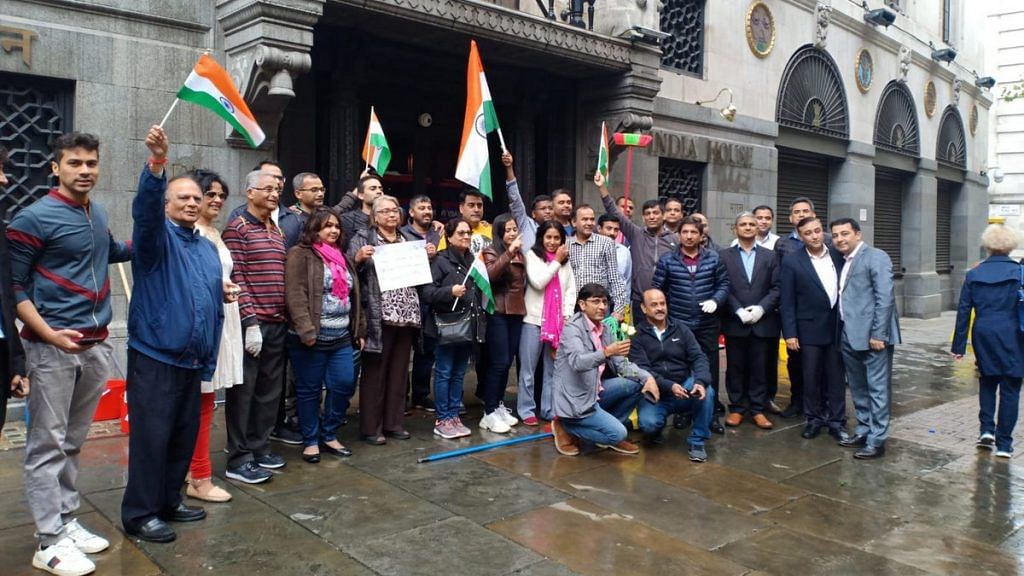When Katie Hopkins, a British pro-India activist, walked into a pro-Pakistan Muslim (mostly male) protest in London this week and asked the protesters some tough questions, she was abused and threatened. The Metropolitan Police did not do enough to stop several moves by pro-Pakistan, anti-India protesters in the last few months. And this was not the first instance of their insensitivity towards the Indian community in the UK.
Refusal to learn lessons
Take the case of the incident at the Indian High Commission in London on 15 August. Hundreds of British-Indians, including women and young children, were peacefully celebrating India’s Independence when they were surrounded by anti-India protesters – some of them hurling stones and eggs at the people and the building. I too received several calls from people under threat for help. Thanks to the timely intervention of high commission officials who took them inside the building, a major crisis was averted. Most from the Labour Party as well as London Mayor Sadiq Khan remained silent.
Undeterred, anti-India protesters marched again in early September, breaking glass windows of the Indian High Commission. They raised slogans on Kashmir. Again, the Met Police did not act as it should have and only arrested two people.
The question remains why authorities refused to learn lessons and allowed the protests.
In India, police authorities would never allow protesters in such close vicinity of any foreign embassy, and rightly so.
Only after strong complaints by the Indian embassy and the Ministry of External Affairs did the UK ban pro-Pakistan and Kashmir protests near the Indian High Commission that were scheduled for Diwali. Even PM Boris Johnson had to weigh in.
Also read: Several European parliamentarians visiting Kashmir are from Right-wing, anti-Islam parties
Anti-India politics
On the political front, the Labour Party has become a common platform for all anti-India people, liberals and Islamists in the UK.
Two years before India scrapped the special status of Jammu and Kashmir through Article 370, Labour MP and Shadow Foreign Secretary Emily Thornberry had already stated that the party would link post-Brexit UK-India trade deal to the Kashmir issue.
The latest resolution of the Labour Party on Kashmir is another example of its anti-India bias. It called for international intervention in the Kashmir issue and UN-led referendum. One major reason is, of course, the changing demography of the UK, especially in England, from where a vast majority of Labour members to the House of Commons get elected. The Muslim population is almost 5 per cent in England, as per the 2011 census. The second reason is of course colonial hangover in parts of the British system, which leads them to think that they still have stakes in India’s internal affairs. Third is self-proclaimed “internationalist” leader of opposition Jeremy Corbyn who has never hidden his dislike for India, even before 5 August.
Also read: How foreign media coverage of Kashmir crisis has become a headache for Modi govt
Resilience of British Indians
Meanwhile, British Indians have shown exceptional resilience against the gang of three: Islamists, Khalistanis and ultra-liberals, with not-so-covert support from the Labour Party to all three. In true Gandhian spirit, British Indians have used the most potent non-violent tool of boycotting anti-India supporters and the Labour resolution. They are persuading a small number of Labour Party members and well-wishers of India to come out in open against the resolution of the party. Close to 100 community organisations showed rare unity for this movement.
Even traditional Diwali visits by Labour leaders to Hindu temples were subdued this year. The heat is being felt by Labour leader Jeremy Corbyn as well, who initially tried to divide the British-Indian community by meeting insignificant groups like the Indian Overseas Congress and when these attempts failed, reluctantly admitted that the resolution language was “open to misinterpretation”. However, he has not changed his position one bit.
Also read: London mayor condemns anti-India march planned on Diwali, calls for cancellation
As Indian authorities continue to ease restrictions in Jammu and Kashmir, India’s well-wishers in the UK will be in a more comfortable position. However, people like Corbyn, Liberal Democrats’ Member of European Parliament Chris Davies (who claimed he was dropped from the MEPs visit to J&K) will continue to oppose India under one pretext or other. Their opposition to India is likely to intensify in coming weeks if the general elections are announced in the UK, as both Labour members and Liberal Democrats would be fighting for a larger pie of the same vote bank.
The post-Brexit scenario will provide a unique opportunity to revisit India-UK relations and strengthen it further. Several new areas of cooperation and coordination can be explored. However, domestic compulsions and ideological opposition to India by a section of the UK’s political leadership is likely to play spoilsport in this process.
The author is In-Charge, Foreign Affairs Dept, Bharatiya Janata Party. Views are personal.
